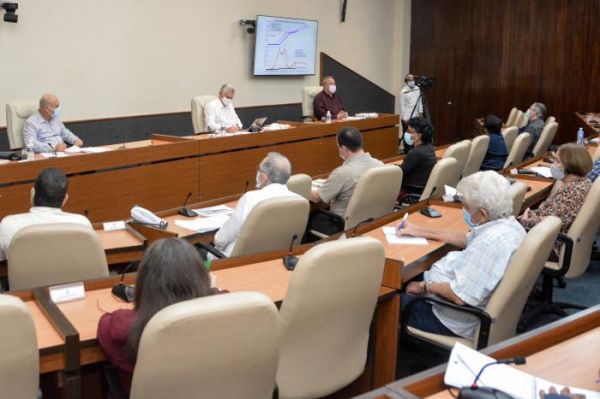
Cuba has made a great contribution and continues to do so, in the fight against COVID-19. “We are not working only for ourselves; we are also working for the world”.
This was acknowledged by the President of the Republic, Miguel Díaz-Canel Bermúdez, when chairing a new meeting with scientists and experts who for eight months have been directly dealing with the epidemic in the country.
Much of the Government’s decisions regarding COVID-19 have been based on the contributions made by the science group created to face the epidemic and as part of which the subgroup of experts on epidemiology and modeling has carried out several useful researches and innovations.
The participants in the meeting, also attended by Prime Minister, Manuel Marrero Cruz; Deputy Prime Ministers Roberto Morales Ojeda and Inés María Chapman Waugh; and the Minister of Public Health, José Angel Portal Miranda, were updated on the main actions so far carried out.
According to Sc.D. Pedro Mas Bermejo, a work system has been developed in the subgroup that, with the support of the University of Havana, has led to a constant learning process.
During these eight months the experts have basically focus on providing knowledge and scientific evidence to support decision-making by the government and the national health system. They have also work in mathematical modeling and predictions to evaluate the behavior of the pandemic; epidemiological research applying information technologies and georeferenced systems; the proposal, development and implementation of epidemiological tools; as well as designing indicators for the monitoring and control of the epidemic in the island, among other onjectives.
Dr. Mas Bermejo also mentioned Cuba’s participation in international forums as well as the publication of 27 papers, eight of them in international magazines.
President Díaz-Canel stressed the importance of giving greater visibility, both in Cuba and abroad, to the work of our scientists and researchers who have so much contributed to the fact that a small nation, with scarce resources and subjected to a ruthless economic war, can exhibit today indicators far superior to those of the so-called first world countries in the control and management of the disease.
(With information from ACN)
 Escambray ENGLISH EDITION
Escambray ENGLISH EDITION





Escambray reserves the right to publish comments.